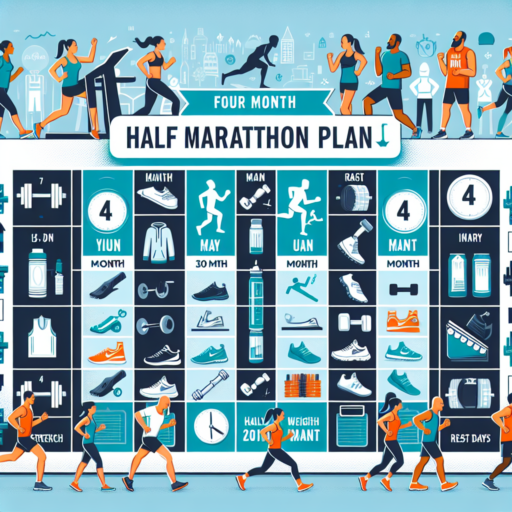How many months do you need to train for a marathon?
Preparing for a marathon is a journey that requires dedication, discipline, and a well-structured training plan. The timeline for marathon training can vary significantly based on an individual’s starting point, running background, and personal goals. Generally, most runners will find a training period ranging from 4 to 6 months to be adequate for building the necessary endurance and strength.
For beginners, those 6 months of training are crucial for gradually increasing mileage without incurring injuries. Starting with shorter runs and progressively increasing the distance each week allows the body to adapt. This period also incorporates rest days and lower-intensity cross-training to enhance overall fitness while minimizing the risk of burnout.
Key Components of Marathon Training
- Base Building: Focusing on slow, steady increases in mileage to establish a strong running foundation.
- Speed Work: Incorporating intervals and tempo runs to improve pace, efficiency, and cardiovascular fitness.
- Long Runs: Weekly long runs that progressively increase in distance, preparing the body for the endurance demands of a marathon.
- Recovery: Prioritizing rest and recovery, including easy runs and complete rest days, to allow the body to heal and strengthen.
For more experienced runners with a solid base of mileage, a shorter training plan of 4 months might suffice. This condensed schedule intensifies more quickly and assumes the runner already possesses the endurance and physical readiness to handle increased mileage and intensity without a lengthy build-up period.
No se han encontrado productos.
What is the average marathon training schedule?
Embarking on the journey to train for a marathon is a significant commitment that requires dedication, time, and a well-structured training schedule. The average marathon training schedule typically spans from 12 to 20 weeks, aiming to build endurance, speed, and running economy. While every runner’s program might vary based on their experience, fitness levels, and goals, there are foundational elements that compose the backbone of most marathon preparations.
At the core of an effective marathon training plan, runners will find a gradual increase in their long runs, which are essential for building the endurance needed to cover 26.2 miles. These long runs are usually scheduled once a week, increasing in distance by no more than 10% each week. To complement these, mid-week runs including tempo runs, speed work, and recovery runs are integrated into the schedule to improve pace and recovery.
Moreover, cross-training activities and rest days are pivotal to prevent overuse injuries and enhance overall physical conditioning. Strength training, swimming, cycling, or yoga can be incorporated on cross-training days to build strength and flexibility, contributing to a runner’s performance and resilience. As marathon day approaches, tapering becomes crucial; reducing mileage in the final weeks before the race to ensure runners are well-rested and their muscles have recovered. Each component of the marathon training schedule is designed to bring athletes to their peak condition, ready to tackle the demanding distance of the marathon.
How many hours a week is marathon training?
When it comes to preparing for a marathon, the time commitment is a crucial factor that varies widely among runners. For beginners, the focus is on gradually building up endurance and distance, which typically means starting with fewer hours per week and slowly increasing the time spent training. For more experienced marathoners, the goal might shift towards improving performance and speed, which can also influence the number of hours dedicated to training each week.
On average, a standard marathon training plan for beginners can range anywhere from 12 to 20 weeks, with the weekly training time ranging from 4 to 8 hours in the initial weeks. This duration includes not just running, but also cross-training, strength training, and adequate rest periods. As the race day approaches, the volume of training usually reaches its peak, with long runs extending the weekly training time significantly.
For those aiming to achieve faster times or who are working on their subsequent marathons, the weekly training hours can be even more extensive. It’s not uncommon for these dedicated athletes to invest 10 to 15 hours per week into their marathon preparation. This incorporates more intense sessions, including tempo runs, interval training, and possibly even more complex cross-training activities to enhance overall fitness and resilience.
How many times should I run 20 miles before a marathon?
While there isn’t a one-size-fits-all answer to how many times you should run 20 miles before a marathon, common running wisdom suggests targeting at least one to three 20-mile runs in the final weeks of your marathon training. This practice aligns your body and mind with the endurance needed for the 26.2-mile race. However, it’s crucial to balance these long runs with adequate recovery to prevent overtraining or injury.
Understanding the Significance of 20-Mile Runs
20-mile runs are a gold standard in marathon training, serving as both a physical and mental benchmark. They allow runners to gauge their marathon pace, nutrition and hydration strategy, and mental resilience. These long efforts simulate the latter stages of the marathon, where physical and mental challenges typically surface. Incorporating 20-mile runs into your training plan strategically can help bridge the gap between your current fitness level and your marathon goals.
Quality Over Quantity
While it might seem beneficial to stack multiple 20-mile runs into your training, focusing on the quality of these runs is far more important than the quantity. A well-executed 20-mile run, with proper pacing and nutrition, offers greater benefits than multiple subpar efforts. It’s about learning and adjusting your strategy, understanding how your body responds, and ensuring you enter the marathon with confidence and resilience.
Each runner’s journey to the marathon is unique, influenced by their baseline fitness, running experience, and even injury history. Therefore, while aiming for those one to three quality 20-mile runs before the marathon, listen to your body and adjust your training plan as needed. Remember, the goal is to arrive at the marathon start line strong, prepared, and injury-free.




